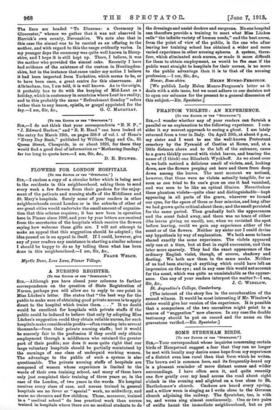PHANTOM VIOLETS : AN EXPERIENCE.
[To THE EDITOR OF THE " SPECTATOR:1 SIR,—I wonder whether any of your readers can furnish a parallel or an explanation to the following experience. I con- sider it my nearest approach to seeing a ghost. I am lately returned from a tour in Italy. On April 10th, at about 6 p.m., my sister and I went to see the well-known Protestant cemetery by the Pyramid of Cestius at Rome, and, at a little distance above and to the left of the entrance, came to a grave thickly covered with violet leaves, and bearing the name of (I think) one Elizabeth Wyckhoff. As we stood over it, we both noticed a delicious smell of violets, and, looking down, saw the flowers peeping out here and there from deep down among the leaves. The next moment we noticed, however, that these were no violets actually tangible, for as soon as one tried to fix one's gaze on one it had vanished, and was seen to be like au optical illusion. Nevertheless these phantom violets—quite clear and distinguishable—kept appearing in all parts of the grave, wherever we turned our eyes, for the space of three or four minutes, and long after we had grown quite critical about them; and the smell persisted for the same period. Then gradually both the appearances and the scent faded away, and there was no trace of either (the leaves giving no smell), nor, when we revisited the spot before leaving, could we gain any experience either of the scent or of the flowers. Neither my sister nor I could devise any hypothesis by way of explanation. We both seem to have shared exactly the same experience. The violets appeared only one at a time, but at first in rapid succession, and then later more sparsely. They had the exact appearance of the ordinary English violet, though, of course, shadowy and fleeting. We both saw them in the same nooks. Neither of us had been staring at anything which could have left an impression on the eye ; and in any case this would not account for the scent, which was quite as unmistakable as the appear- ance. Can any of your readers interpret the matter P—I am,
Sir, &c., J. C. WINSLOW. St. Augustine's College, Canterbury.
[The interest of the story lies in the corroboration of the second witness. It would be most interesting if Mr. Winslow's sister would give her version of the experience. It is possible that a comparison of the two narratives might point to a source of "suggestion" now obscure. In any case the double testimony should be put on record and the name on the gravestone verified.—En. Spectator.]














































 Previous page
Previous page